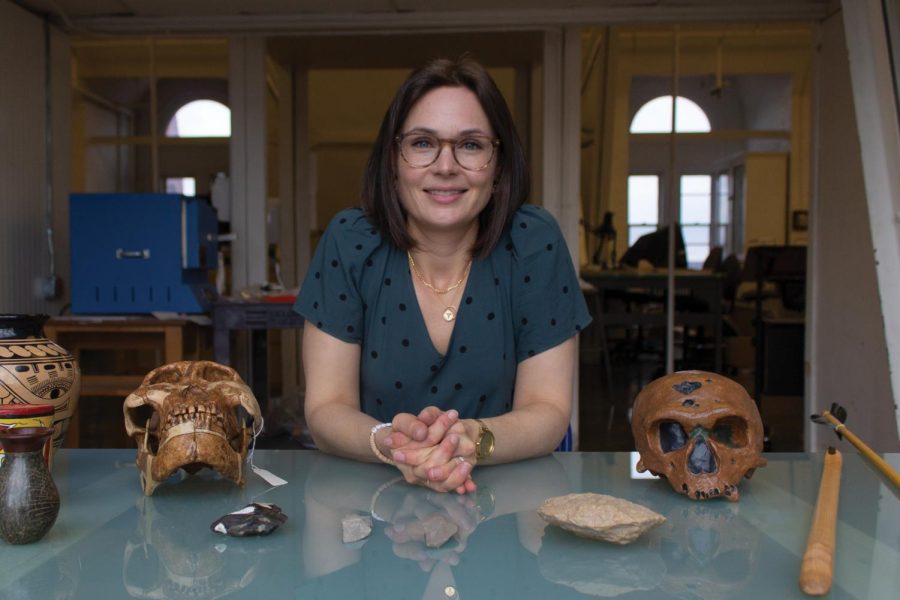Assistant Archeology Professor Marieka Brouwer Burg in her office with replica Belizean pots and replica skulls March 24.
Professor shares love of archeology with students
April 1, 2022
Assistant Archeology Professor Marieka Brouwer Burg came to UVM two months before the COVID-19 pandemic hit and classes went online. Now, she relishes the opportunity to interact with her students, she said.
Burg is an anthropological archaeologist who started teaching at UVM in January 2020. Returning from an online format to a traditional, in-person model allows her to instruct archeology the interactive way it is intended, she said.
“I really want to get students to do experiential hands-on learning,” Burg said. “The attraction of archeology is that it’s book reading but it’s also doing, whether that’s outside or getting busy in a lab.”
Burg’s interest in archeology started in fifth grade when she did a report on Mayan civilizations.
She later received her bachelors from University of Wisconsin-Madison and both her Masters and Ph.D at Michigan State University, according to the department of anthropology website.
Interactive field work, such as digging up artifacts and looking at 1500 year old ceramics, is an important part of anthropology studies, Burg said.
“Archaeology really is a science,” she said. “As archaeologists, we see ourselves as stewards of the past. We’re not in it for the money or the fame, we start out with our hypothesis and our observations.”
The COVID-19 pandemic was disruptive to the archeology field in general, Burg said.
Burg conducted research in Belize, studying the effects of paleoenvironmental and paleoclimatic change on past human land use and decision-making for the past 11 years, according to the department of anthropology website.
Her fieldwork paused in 2020 due to the pandemic, she said.
“I’ve been on the same project for 11 years with the same people, almost the same core group of people,” Burg said. “This past January, we were able to go back with our core group and be together again for the first time in two years.”
The gap in her fieldwork made Burg think critically about how Belizean archeologists face barriers entering the field, she said.
“Archeology is still sort of inherently colonialist in the way that we work,” she said. “It’s nice to see everybody again, but it really makes you feel your privilege.”
In the future, Burg hopes to see a stronger educational focus put on foreign archaeologists, she said.
“We’re galvanized to ensure we’re putting as much energy into the training of Belizean students, K-12 as well as university, so that it’s not just foreign archeologists who are working in the country.” Burg said.
She felt supported by other professors and her students despite being introduced to UVM during a turbulent time required a lot of resilience, Burg said.
“I feel really lucky because I have nine mentors who I think have my best interest in mind and are always willing and able to help me,” Burg said. “And the students were really forgiving of me with technology.”
Burg taught classes in the Ira Allen Chapel during the fall 2020 term, where students sat socially-distanced at church pews instead of desks, she said.
“I had a lot of fun that semester,” she said. “It was the hardest thing I had to do, but I think we still got a lot out of that experience.”
Burg now teaches on the fifth floor of Williams. Having students stop in to say hi creates a sense of camaraderie, Burg said.
